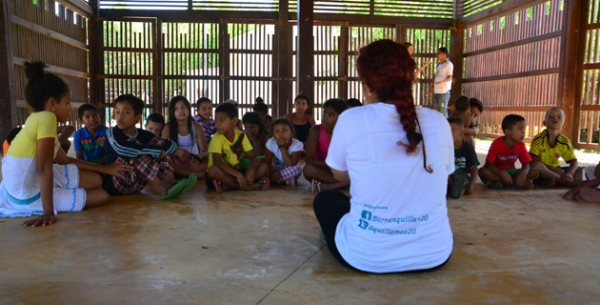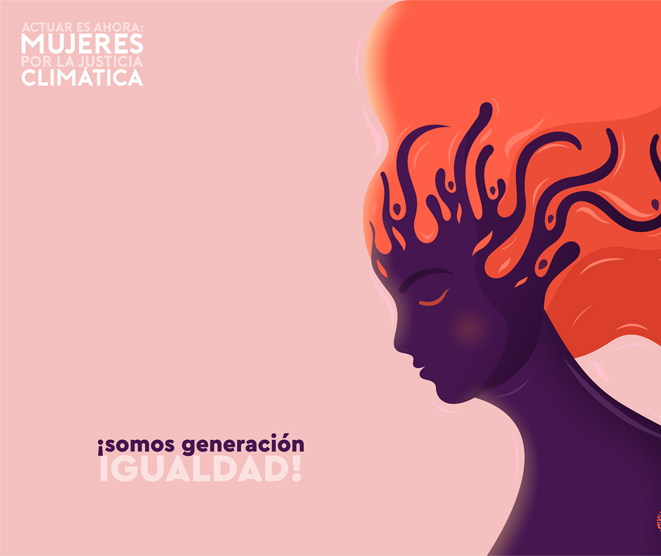Climate Change is a Matter of Social Justice and Human Rights!
Xiomara Acevedo tells us about young journalists' path to confront climate change and strengthen environmental justice, two fundamental elements for the protection of nature in this decade.
Available in:

Xiomara Acevedo is an internationalist, specialist in leadership, climate change, and cities. She is the founder and executive director of the Barranquilla+20 Foundation and has more than nine years of experience in territorial climate change management and policy, activism, and environmental governance.
Her Foundation, which has received the Gates Foundation Youth Fellowship in the gender equity division this year, aims to implement collective climate actions for a healthy planet through the empowerment of children and youth.
In this interview for Datasketch, she tells us, from his experience and participation in COP26, which is the path young journalists can take to address climate change and how environmental justice can be strengthened, two fundamental elements for protecting nature in this decade.
What contributions can be made from the community and governmental levels to support climate action?
If we look at it from the global context, we should highlight the Paris Agreement (adopted by 197 countries in 2015). It has guidelines to address climate action from education, communication, mitigation, adaptation, and financing. With the Agreement, it became evident that all sectors must incorporate territorial climate change management to decarbonize our economies and adapt human and ecological systems to present and future impacts.
If we start incorporating climate change into our agendas, we will be better prepared, increasing our management capacity.
From the governmental side, the case of Colombia can be analyzed, which already has a climate change law, Law 1931 of 2018, and which since 2015 presented its Nationally Determined Contribution, committed to reducing its greenhouse gas emissions.
The Law established that capital cities and departments must have a Comprehensive Territorial Climate Change Management Plan. It is composed of measures based on scientific information and prioritization of ethnic and local communities, youth, women, among other groups.
This is where the community factor comes in. We know that climate change is a global problem, but we must start at the local level to begin to reverse it. There is a great opportunity for climate action. For example, from the Barranquilla +20 Foundation we have linked local narratives on the environment for people to get involved in its protection.
We are facing discourses that show us more the issue in other regions, and therefore we tend to believe that it has nothing to do with us.
Arranca la #COP26 y desde @Bquillamas20 queremos recordar que lo que está en riesgo es la salud de los ecosistemas y de las comunidades.
— Barranquilla+20 (@Bquillamas20) October 31, 2021
Hoy les presentamos #EmergenciaClimáticaAtlántico desde el humedal #Ramsar Ciénaga de Mallorquín: https://t.co/3hjpt1Qv3J pic.twitter.com/tE0ZVjZzYq
What do you recommend to journalists, especially the young, when addressing this climate crisis? How could environmental journalism be strengthened?
For journalism, it is essential for newsrooms to communicate effectively about climate change, mainly because very little is said about this problem. Only when there is a COP do people start talking about it. And that should not be. Journalists have to do it every week. We need news every day about climate change, the state of nature, and the human systems that inhabit it.
We require monitoring the financing for climate action and the projects already underway in the countries because we have to demonstrate whether they are really helping to reduce emissions and adapt to climate change.
Journalism plays a fundamental role in ensuring that these issues are not only at the scientific and political level, but also a more social and cultural level. Associating it with culture is a pending task because it will be a determining factor in addressing climate change in an intergenerational manner. One of the significant cultural challenges, which applies globally, is knowing how to relate to nature differently to make better consumption and production decisions.

Xiomara Acevedo leading a session of the MallorquínVIVE- School of Water project, finalist of the Bayer Young Community Innovators 2014. Photo by Barranquilla +20.
Two concepts are gaining attention: environmental justice and transparency in environmental finance. Why are they important?
Environmental justice is a concept that focuses on how to redistribute impacts and waste in a territory according to a given activity. We talk about it more because it has become evident that waste goes to vulnerable communities or those living in risk areas in the metabolism of cities or economic sectors. And these only keep the damages, not the profits.
It is also a fundamental concept for the environmental movement because it seeks to protect the least responsible communities for greenhouse gas emissions and suffer the most significant losses from climate change. In applying environmental justice, we understand that excessive global temperature rise is not just an economic or political issue, but involves the livelihoods of entire populations that depend directly on the balance of ecosystems.
Climate change is a social justice and human rights issue. Without environmental justice, community decision-making regarding agriculture, land management, or water conservation is constrained.
This is complemented by transparency because it puts us in perspective. Every investment labeled for action against climate change must be clear and concrete, starting with reporting how much gas emissions it is reducing and what capacities (for resilience) it is strengthening.

Members of the Barranquilla+20 Foundation clean the Bocas de Ceniza beaches, in the department of Atlántico, in 2021. Photo by Barranquilla +20.
For COP26, the lack of representation of women in the environmental agenda was evident. What contributions does a feminist approach to the environment provide? What stories do you think need to be told so that more people value the role of women in the protection of nature?
The intersection between gender and climate change is a recent issue, although it is urgent. A group, The Women and Gender Constituency, has positioned feminism within the COP, with priorities such as managing climate ambition to reach a 1.5°C increase in global temperature. They also promote addressing effective solutions in markets, which are not contributing to that goal and do not have a Human Rights approach.
Their work is an example of transparency, involving women and girls in these discussions and recognizing the differentiated roles and contributions they make to the climate and territorial struggle.

Official poster of the Women for Climate Action project, which provides 15 young women leaders in Colombia with the necessary tools to advance and support their different advocacy strategies for gender and climate justice. Photo by Barranquilla +20.




